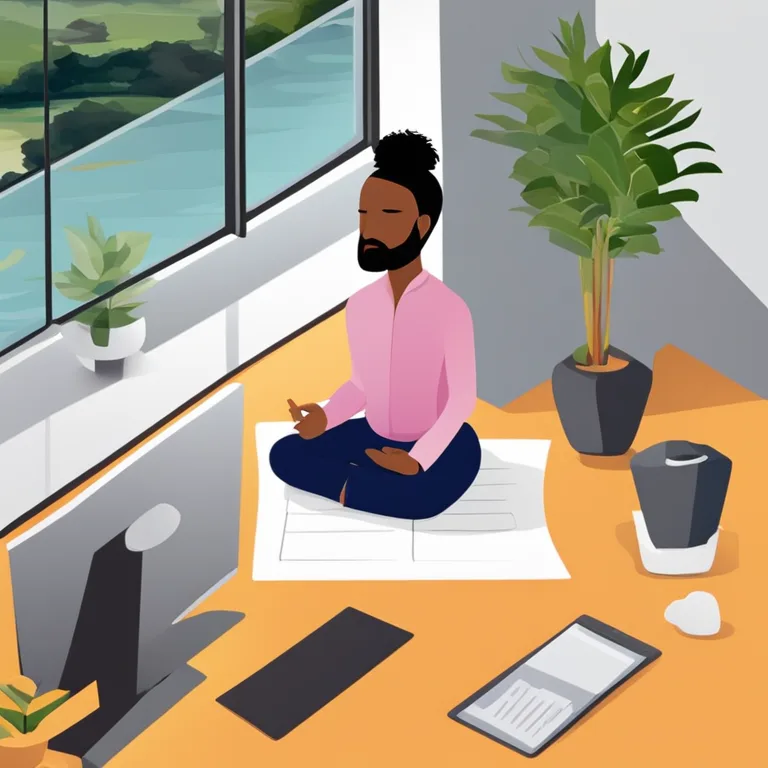
Meditation: Pathways to Inner Peace
Discover effective meditation techniques and their numerous benefits for both mind and body, fostering well-being and tranquility.
article by Hina Kurosawa
An Introduction to Meditation
Meditation is a practice rooted in ancient traditions, yet it remains a timeless tool for cultivating inner peace, clarity, and emotional stability. This ancient technique has gained modern significance, with a myriad of scientific studies validating its positive effects on mental and physical health. In this digital age, meditation serves as a sanctuary for individuals seeking solace from the incessant pace of life and the information overload that defines our era. Despite its historic origins, meditation continues to evolve, integrating contemporary methods that cater to the diverse and dynamic needs of today's practitioners.

Varieties of Meditation Techniques
There are numerous meditation practices to explore, each offering unique pathways to tranquility. Mindfulness meditation emphasizes present-moment awareness, urging practitioners to observe their thoughts and feelings without judgment. Transcendental Meditation, a form of silent mantra meditation, strives to elevate consciousness. Guided visualizations transport one to peaceful settings through descriptive prompts. Body scan meditation directs attention to different body parts, cultivating a mindful connection between the mind and the physical self. Insight (Vipassana) meditation fosters a deep understanding of the nature of reality. The diversity of these practices ensures that individuals can find a method that resonates with their personal preferences.

Health and Wellness Advantages
Meditation's health benefits are manifold and significant. Research indicates that it can reduce stress, anxiety, and depression by altering the body's stress response. Regular practice has been linked to lower blood pressure, enhancing cardiovascular health. It also bolsters the immune system, making meditators potentially more resilient to illness. Meditation contributes to improved sleep quality and helps manage pain, making it a holistic aid for various physical ailments. Moreover, with its potential to enhance neuroplasticity, it can foster better cognitive functions over time, suggesting its role as a valuable tool for brain health maintenance well into the future.

Mindfulness and Productivity
In a society that praises efficiency, meditation offers a paradoxical solution: by slowing down, we can actually enhance our productivity. Mindfulness practices cultivate concentration and focus, which can lead to improved performance in the workplace and in educational settings. By training the mind to be less distracted and more present, meditation can help individuals tackle their daily tasks with greater effectiveness. Furthermore, it nurtures creativity, as a calm mind is often a fertile ground for new ideas and innovative thought processes. In the context of the 2020s' "attention economy," where our focus is a precious commodity, meditation becomes an invaluable asset for personal and professional development.

Emotional Intelligence and Relationships
Emotional intelligence is the bedrock of healthy relationships, and meditation can greatly enhance this quality. By facilitating self-awareness and compassion, meditation encourages individuals to understand and regulate their emotions. This reflective practice can improve communication and empathy, fostering stronger personal and professional relationships. In addition, techniques like loving-kindness meditation specifically aim to augment feelings of goodwill towards oneself and others, promoting a sense of connectedness and community that is especially crucial in our increasingly isolated world.
A Gateway to Spiritual Exploration
For many, meditation serves as an entry point to a deeper spiritual journey. It offers a means to explore one's inner self beyond the material realm, inviting a sense of transcendence and connection to something greater. Whether one adheres to a specific faith or prefers a secular approach, meditation accommodates a broad spectrum of spiritual beliefs. In an era that often prioritizes empirical knowledge, meditation allows space for the mystical and inexplicable, balancing humanity's technological advancements with the eternal quest for meaning and enlightenment.
Adopting a Meditative Practice in Modern Life
Integrating meditation into modern life may seem daunting, but it is highly adaptable and can be tailored to individual lifestyles. Start with just a few minutes daily and gradually increase the duration. Mobile apps and online platforms now offer guided sessions that can be accessed anytime, anywhere. The flexibility of meditation makes it conducive to busy schedules, allowing even the most time-constrained individuals to reap its rewards. As society continues to evolve, embracing meditation can act as a counterbalance, personally and collectively, to the challenges of our ever-changing world.
Published: 12/20/2023
Modified: 12/20/2023
More predictions
Come back here soon to learn more about yourself and your future


Meditation: Unveiling The Optimal Practice Duration
Discover how much time to dedicate to mindfulness meditation for personal growth and well-being.


Advanced Techniques For Deepening Meditation
Discover the serene path to mindfulness meditation with this simple, step-by-step guide focused on fostering tranquility and self-awareness in your daily life.


Beginner's Guide To Mindful Meditation
Discover key steps to starting your journey into mindfulness meditation with this beginner-friendly guide.